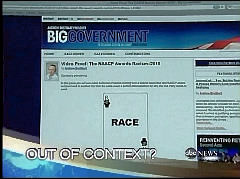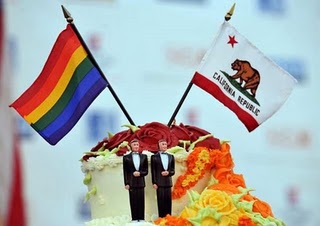ABC and CBS last week jumped to advance the NAACP’s charge of racism within the Tea Party movement with friendly stories which provided corroboration for the allegation as neither identified the left-wing group’s ideology. On Tuesday night, however, the ABC and CBS evening newscasts had a sudden concern for the accuracy of the racism charge leveled against a USDA official via video posted by BigGovernment.com , a group the networks were quick to label “conservative” as they painted Shirley Sherrod as a victim of distorted editing of the video of her remarks – as if the news media never does that. Meanwhile, the NBC Nightly News, which last week managed to refrain from promoting the NAACP’s anti-Tea Party agenda, ran a full story on Sherrod and BigGovernment.com’s “lie,” but also ran the very first broadcast network story on the Justice Department’s refusal to pursue the New Black Panther Party voter intimidation case. “We turn now to a story about race, politics and what constitutes a rush to judgment,” ABC anchor Diane Sawyer intoned. (Last week: “The NAACP has just adopted a resolution this evening at its annual convention condemning quote, ‘racist behavior by Tea Party members.’”) Jake Tapper referred to “a conservative Web site posting a video clip of Department of Agriculture official Shirley Sherrod at an NAACP event talking about meeting with a white farmer…” He noted the NAACP, which had condemned Sherrod, later in the day “reversed course, saying they’d been snookered by conservative media.” On CBS, Katie Couric announced: “Agriculture Secretary Tom Vilsack defended his decision to fire a black official who was accused of discriminating against a white farmer. But the ousted official denies the allegation and so does a farmer.” (CBS Evening News anchor Harry Smith last week: “The Tea Party movement has come under fire from the NAACP. The accusation: the party tolerates racism in its ranks.”) On Tuesday night, CBS’s Jan Crawford cited how Sherrod’s remarks “lit up the blogosphere after a conservative Web site this week aired it and suggested there was reverse racism in the administration,” but “Sherrod then angrily answered. She told CNN she was unfairly forced out by a White House skittish about issues of race.” Crawford also noted how the NAACP blamed distorted editing for fooling them: “They said the speech was deliberately edited to create a false impression of racial bias.” On NBC, Brian Williams set up a full report on the controversy unleashed by the video clip “posted on a conservative blog” and Mark Whitaker, the NBC News Washington Bureau Chief, fretted over lies on the Internet: Mark Twain said, a century ago, that a lie can get make its way half way around the world before the truth has its shoes on. That’s just been intensified, both in term of the viral nature of these stories, but also, as we’ve seen, the potential to edit them and distort them before they get out there. NBC also aired the first broadcast network look at the New Black Panther Party case as Brian Williams introduced a full story from Pete Williams: Another story involving race and politics. It’s been gaining traction and attention. This started with amateur video of two men standing at the entrance of a Philadelphia polling place during the last presidential election. One of them was holding a club, many of those who’ve seen the video see it as a clear case of voter intimidation at a polling place. But the Justice Department did not, they dropped the case without saying much about it. From last week: July 13 : ABC Hypes NAACP Indictment of Tea Party as Racist, a Smear the Network Stoked July 14 : CBS Uses Al Sharpton to Boost NAACP’s Accusation Tea Party is ‘Tolerating Bigotry’ The MRC’s Brad Wilmouth provided these transcripts of the stories from ABC and CBS on Tuesday night, July 20: ABC’s World News: DIANE SAWYER: And we turn now to a story about race, politics and what constitutes a rush to judgment. It involves a black federal employee, a tape posted on the Internet, and what she says was misinterpretation about statements she made decades ago. And the White House reacted. Jake Tapper reports. JAKE TAPPER: It was combustible. A conservative Web site posting a video clip of Department of Agriculture official Shirley Sherrod at an NAACP event talking about meeting with a white farmer. SHIRLEY SHERROD, FORMER USDA EMPLOYEE, IN VIDEO: I was struggling with the fact that so many black people had lost their farm land, and here I was faced with having to help a white person save their land. So I didn’t give him the full force of what I could do. TAPPER: Last night, an Obama administration official called Sherrod in her car and demanded she pull over and type a resignation letter in her Blackberry. Agriculture Secretary Tom Vilsack said in a statement that “There is zero tolerance for discrimination” at his agency. None of them bothered to learn that the incident in question happened 24 years ago when Sherrod worked for a nonprofit. TAPPER ON PHONE TO SHERROD: The question is, why would you look at the white farmers differently than you looked at the black farmers? SHERROD: Because I always, up to that point, I felt they had all of the advantages. TAPPER: Then, in 1986, she changed her mind, as she said in the speech. SHERROD: That’s when it was revealed to me that it’s about poor versus those who have. TAPPER: In your view, your story was about how race shouldn’t matter with people. SHERROD: Right. And they turned it into saying that I’m a racist. TAPPER: And you’re not? SHERROD: You better believe it. TAPPER: And the white farmers in Sherrod’s story agree, and credit her with saving their farm. Roger and Eloise Spooner from Iron City, Georgia, consider Sherrod a friend. ROGER SPOONER, FARMER: If it hadn’t been for her, we would have, it wasn’t a matter of a few months and we would have lost it. TAPPER: And, Diane, earlier today, the NAACP was applauding Secretary Vilsack’s decision, but just a few minutes ago, they reversed course, saying they’d been snookered by conservative media, wanted Sherrod reinstated. Secretary Vilsack is standing by his decision. Diane? SAWYER: Quite a TV drama today. Thank you, Jake Tapper. CBS Evening News: KATIE COURIC: Meanwhile, in Washington today, Agriculture Secretary Tom Vilsack defended his decision to fire a black official who was accused of discriminating against a white farmer. But the ousted official denies the allegation and so does a farmer. Here’s our chief legal correspondent Jan Crawford. JAN CRAWFORD: It started with a speech by USDA official Shirley Sherrod describing her attitude 24 years ago toward a white farmer. SHIRLEY SHERROD, FORMER USDA OFFICIAL: And here I was faced with having to help a white person save their land. So I didn’t give him the full force of what I could do. CRAWFORD: That comment in a speech to the NAACP lit up the blogosphere after a conservative Web site this week aired it and suggested there was reverse racism in the administration. Agriculture Secretary Tom Vilsack reacted swiftly. He said today the USDA had zero tolerance for discrimination and fired Sherrod for those comments. TOM VILSACK, USDA SECRETARY: When I saw the statements in the context of the statements, I determined that it would make it difficult for her to do her job as a rural development director. CRAWFORD: But, as with so many issues of race, there is a lot more to this story. Sherrod said later in the same speech she was wrong and ultimately helped the man save his farm. But that statement didn’t get out on the Internet. And when the farmer and his wife heard the charges against the woman who helped them 24 years ago, they were shocked. ROGER SPOONER, FARMER: She was just as nice as she could be to us. As far as race, I think somebody just wants to start something. CRAWFORD: Sherrod then angrily answered. She told CNN she was unfairly forced out by a White House skittish about issues of race. SHERROD, ON CNN: I had at least three calls telling me the White House wanted me to resign. CRAWFORD: Vilsack said the decision was his alone. VILSACK: So I made this decision. It’s my decision. Nobody from the White House contacted me about this at all. CRAWFORD: But in this growing controversy, this much is clear: Shirley Sherrod, now out of a job, helped Roger and Eloise Spooner. SPOONER: She saved our farm, 400 and some acres, almost 500 acres. She saved our farm. CRAWFORD: Now, while Secretary Vilsack said this issue is closed, but the cables having a field day and the blogs anything but done, the Secretary may be in for a surprise. Katie? COURIC: And, Jan, I know the NAACP initially condemned Sherrod’s remarks, but now that organization has put out a new statement. CRAWFORD: Katie, they just released a statement. They said they were snookered by these initial reports, they were completely changing course on this. They’re urging the Secretary to reconsider firing her, and they said the speech was deliberately edited to create a false impression of racial bias.

Go here to read the rest:
Nets Which Promoted NAACP’s Attack on Tea Party Treat Sherrod as Victim; NBC First to Voter Intimidation






























